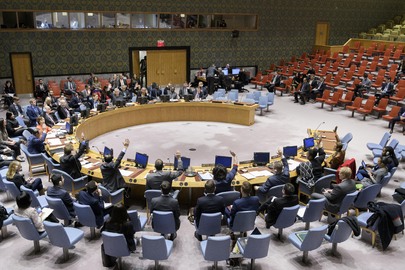NEW DELHI: India’s set for smooth sail as the United Nations General Assembly votes today to elect five non-permanent members of the Security Council. It’s the only contender for the sole seat from the Asia Pacific grouping (China and Pakistan included) that has unanimously backed its candidature. This will be India’s eighth stint at the global high table and it will take effect from January next year, for a period of two years.
So what does India hope to achieve? External Affairs Minister S. Jaishankar has already spelt out the roadmap, with five broad contours—putting forward its development agenda, effective response to global terrorism, reforms of multilateral systems, comprehensive approach to UN peacekeeping and technology with a human touch.
India’s overall priority will be on reforming multilateralism—a point Prime Minister Narendra Modi has harped on about. “India has tried to position multilateralism in the context of tremendous changes that are taking place in international relations today,” says Asoke Mukerji, who has been India’s Permanent Representative to the United Nations. A key step in that direction will be reform of the Security Council to reflect contemporary geopolitical realities. India has been a strong claimant to a permanent seat on the Council. And though four of the five permanent members—U.S., UK, France and Russia—have declared support to India’s claim many a time, there has been no forward movement.
“The main stumbling block to reform in the Security Council is opposition by the five permanent members. None of these wants any text-based negotiations to amend the charter, knowing that in 1963, the only time the charter was amended, it was done through a resolution adopted by the General Assembly. The opposition of the permanent members of the Security Council to any resolution to amend the charter stems from the fact that the vast majority of the General Assembly wants to renegotiate the veto power,” said Ambassador Mukerji.
Inter-governmental negotiations on UNSC reforms have been going on since 2008 but they are not going anywhere because there is no text on the table which can be taken up paragraph by paragraph.
So is there any other way to give things a push? Yes, says Ambassador Mukerji. “Countries that want reform of UNSC can table a resolution (that broadly follows the long discussions that have taken place for 15 yrs) in the plenary of the General Assembly for adoption by two-thirds members (129 countries). But this requires a lot of coordination and activity”.
India’s other focus would be on tackling terrorism by trying to enforce UNSC decisions with the cooperation of other multilateral bodies. One of them is the Financial Action Task Force (FATF) which has been used in the last few years to put pressure on Pakistan to fulfil its obligations on tackling terror financing.
And then there is the issue of deployment of peacekeepers. India is the only nation to have contributed over 240,000 troops to UN peacekeeping missions but has not been consulted on how troops are deployed. Currently, Indian troops are lending their services in large numbers in DR Congo, South Sudan and Lebanon but the UN missions there haven’t been able to make much difference on the ground.
As an elected non-permanent member, India can push these issues but not beyond a point. Ironically, the five permanent members of the Security Council, who were never elected but self-selected in 1945 when the UN charter was drafted, still call the shots.





